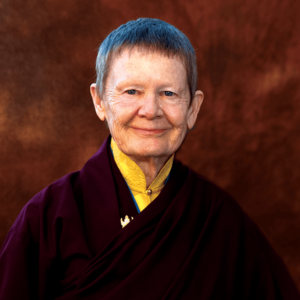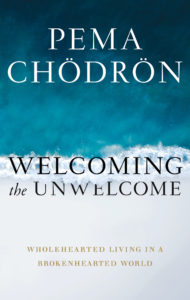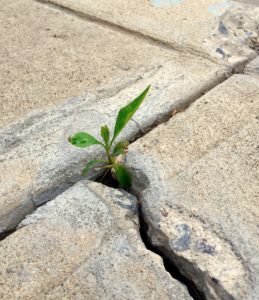Shambhala Publishing
October 2019
Pema Chödrön is an American Tibetan Buddhist and best-selling author of over 20 books. I first came across the beloved Buddhist nun and spiritual teacher when a friend gave me The Pocket Pema Chödrön for Christmas a few years ago. This little paperback, filled with short selections from her many decades of study and writings, has stayed in my purse ever since – and is definitely looking more than a little tattered. Whenever I find myself waiting in line somewhere, with time on my hands, I bring it out. Even though I’ve read it through a few times already, it never fails to encourage and inspire me. I now firmly count myself among this 83-year-old Buddhist nun’s legion of fans throughout the world.
Ani Pema (“Ani” is a prefix added to the name of a nun in Tibetan Buddhism, akin to “Sister” among Catholic nuns) was born Deirdre Blomfield-Brown in New York City in 1936. After what she describes as a pleasant Catholic childhood, she married at the age of 21, went on to study at the University of California at Berkeley, and became an elementary school teacher. She had two children with her first husband, but divorced in her mid-twenties and remarried years later. Her second marriage came to an end when her husband revealed he was having an affair and wanted a divorce.
Ani Pema came to explore her spirituality as an attempt to cope with the emotional trauma of her failed marriages. She cites the moment her second husband revealed his affair to her as a genuine spiritual experience – a moment where time truly stood still. To cope with her pain, Ani Pema sought various forms of therapy. It took a year filled with fear, rage and what she describes as general “groundlessness” for her to begin piecing her life back together.
Her true awakening began when she came across an article about Buddhist concepts written by the man who would become her most influential teacher, Chögyam Trungpa Rinpoche. The article suggested making peace with discomfort rather than trying to banish it. Sparked by an interest in his teachings, Ani Pema went on to study with Lama Chime Rinpoche on frequent trips to London, and became a novice Buddhist nun in 1974. Lama Chime encouraged her to work with Chögyam Trungpa Rinpoche, and she studied under him from 1974 until his death in 1987. She received the full bhikshuni ordination in the Chinese lineage of Buddhism in 1981 in Hong Kong.
Ani Pema served as the director of the Boulder Shambhala Center, a retreat center in Boulder Colorado, from 1981 to 1984, and then went on to help establish Gampo Abbey in Cape Breton, Nova Scotia. The Abbey, completed in 1985, was the first Tibetan Buddhist monastery in North America for Western men and women, and Ani Pema took on its directorship. She remains to this day as the spiritual director of Gampo Abbey, which she credits as being the place where she truly let go of fear and ego. She continues to help establish the monastic tradition in the West, teaching in Canada and the United States – though she looks forward to an increased amount of time in solitary retreat in the future, under the guidance of her current teacher Dzigar Kongtrul Rinpoche.
Ani Pema’s first book, The Wisdom of No Escape, was published in 1991, followed by Start Where You Are in 1994, and When Things Fall Apart in 1997. Readers were moved by her earthy, insightful teachings, and her retreats became full to overflowing wherever she went. Over the years her fame as a teacher has grown, and she is the best-selling author of over twenty books. Oprah Winfrey calls her “one of the most influential voices in contemporary spirituality, the writer whose books are passed from friend to friend.”
Welcoming the Unwelcome: Wholehearted Living in a Brokenhearted World (Shambhala Publications; October 2019) is Ani Pema’s first new book in over seven years. I was delighted to hear that she is still writing and sharing her wisdom – and thought that the title of her latest book sounded very relevant for our times.
In her new book, Ani Pema addresses important, germane areas of life that are a struggle for many of us, in chapters such as Overcoming Polarization, The Fine Art of Failure, How Not To Lose Heart, and Experiencing Nowness.
She opens the book by asking us why we engage with spiritual teaching. What is our intention? To learn how to better deal with all the uncertainty in our lives? To gain wisdom about ourselves? To help escape certain emotional or mental patterns that undermine our wellbeing?
Those all are good reasons, but Ani Pema points out that her Mahayana Buddhist tradition arouses another motivation, called “bodhichitta”. In the Sanskrit language, “bodhi” means “awake”, and “chitta” means “heart” or “mind”. So, in her tradition, the aim of engaging with spiritual teaching is to fully awaken our hearts and minds, not only for our own personal wellbeing, but also to bring benefit, solace and wisdom to others. As she puts it, an awakened heart brings with it “the wish to be free from whatever gets in the way of our helping others.”
So how do we achieve an awakened heart – one that will truly benefit others? The advice she gives might seem surprising. It’s advice that she herself received from her teacher Trungpa Rinpoche: begin with a broken heart.
In other words, instead of avoiding our feelings of sadness or discomfort or pain, we need to allow ourselves to experience them. When we give ourselves the freedom to connect and just “sit” with our own raw feelings of loneliness, embarrassment, jealousy, anger, or shame, we increase our capacity to be present to the suffering of others. We find ourselves “standing in the shoes of humanity” – with a growing sense of courage, and a longing to help those around us.
So much of the wisdom in this book harmonizes with my Christian faith, such as cultivating compassion for others, developing a practice of meditation, increasing our appreciation for the beauty around us, and living in the present moment rather than worrying about the past or the future. All these practices and principles have also been modelled by many of the Christian figures throughout the centuries who have guided and enlightened my faith.
I also appreciate how Ani Pema writes very openly in this book, using stories about her own flaws and heartbreaks to lead us into new truths about ourselves. She models a great sense of humour about her shortcomings, and isn’t afraid to share the sometimes difficult path she has traveled to learn important lessons – all of which makes for fascinating reading. She writes movingly about learning to see the basic goodness in the people she lives with, the strangers she meets…and in herself.
She also provides a number of examples of easy but very effective practices that have made a difference in her life, and which I want to incorporate in my own mental health toolbox. Here are just two examples:
- Get in the habit of looking at people around you, whether they are strangers, friends or family members, and say these words to yourself: “Just like me.” In other words, recognize that, just like you, this person: loses it sometimes; doesn’t like feeling uncomfortable; wants to be admired; gets embarrassed easily; often feels insecure.
- This one I have especially enjoyed – a practice that helps us “be in the moment” by taking mental snapshots. Close your eyes, turn your head in any direction, and then abruptly open your eyes and take a few minutes to “see” what’s in front of you. I’ve been delighted how this simple practice has helped me slow down and perceive ordinary things in fresh and stimulating ways.
I also appreciated the three step-by-step guides at the end of the book that can help bring light to the darkness we all face at times. The first is a guide to a basic sitting meditation, which Ani Pema describes as a “golden key that helps us to know ourselves”. The second takes us through a Tonglen practice, which is a method for connecting with suffering – our own and that which is all around us – to help us overcome our fears. The third is called LESR, which stands for “locate, embrace, stop, remain”. This practice is an easy-to-remember way of combining some of the practices in the book that can help us open our hearts and minds in the places where we all habitually contract and go inward. All these practices can assist us to “welcome the unwelcome”, and learn to live life with greater awareness and compassion.
For more information, visit www.gampoabbey.org and www.pemachodronfoundation.org.










